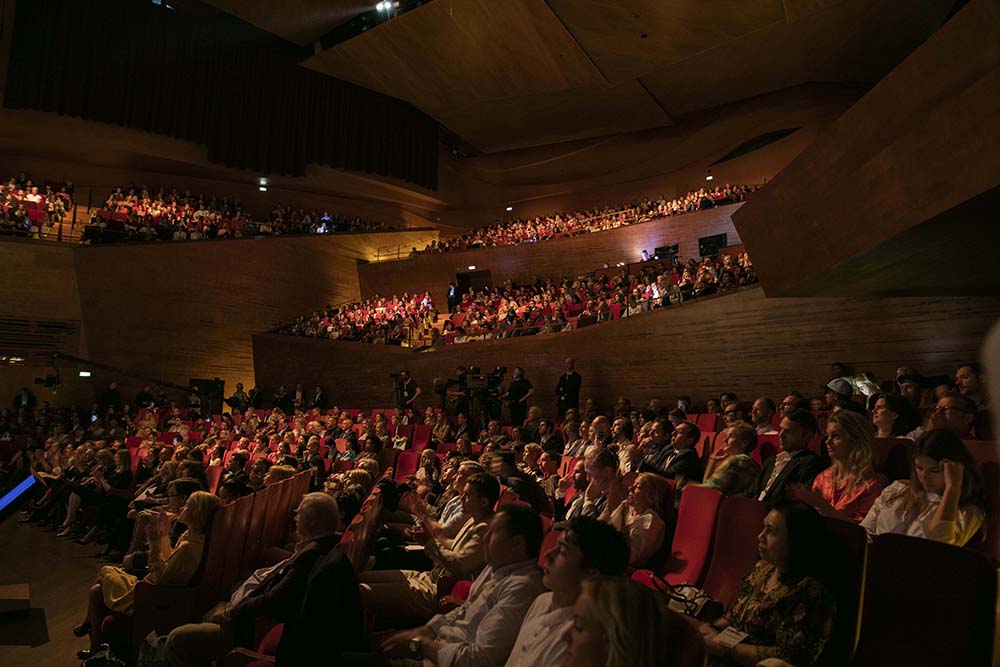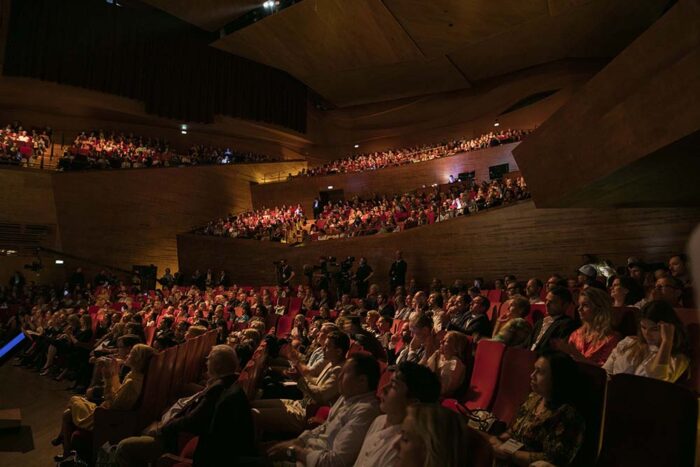La semana pasada en Copenhagen Fashion Summit, Juan Orlando Hernández, Presidente de Honduras hizo la siguiente invitación: “Si quisieran ir a Honduras a conocer por ustedes mismos, yo los recibiré personalmente en el aeropuerto”.
Ignorando las molestias en la parte posterior del auditorio que llamaron “Señor Presidente, detenga a los militares de asesinar a activistas” el Presidente de Honduras lanzó para promocionar el país como líder de exportación de prendas a Estados Unidos de América y tiene el objetivo de exportar más al mercado Europeo. La industria del vestir y textil es parte del nuevo plan Honduras 2020, un proyecto de $3.4 miles de millones, que tiene como meta hacer que Honduras sea la elección de muchas marcas para proveer de forma sustentable. “Haremos esto mediante un verdadero modelo sustentable, enfocándonos en factores clave como condiciones laborales sustentables, protección del medio ambiente, utilizando la última tecnología para reducir el consumo de los recursos, cambiando los combustibles a energías renovables” mencionó Juan Orlando Hernández, quien continuaba enfatizando el objetivo de su país por tener el 80% de sus energías de origen renovable para el 2020.
El compromiso por reducir los combustibles no renovables claramente no exenta al mismo Presidente, quien rentó un jet de lujo para ir a la conferencia de Vista Jet, entre sus clientes tienen a celebridades como Beyonce y los Beckham. La presentación del Presidente le costaría $360,000 viajando solo, de acuerdo con la información del sitio, dando esto decenas de críticas en la página de Facebook de Copenhagen Fashion Summit.
El Presidente seguía mencionando a las 1200 personas del público haciendo hincapié en cómo su país toma muy en serio el lado social de la sustentabilidad. “Gozamos de un excelente y seguro ambiente de trabajo y cuidar a nuestra gente es nuestra principal atención y responsabilidad”.
El Presidente llegó a decir que Honduras era “el segundo lugar más justo para la producción de prendas de vestir”. Después de un correo electrónico al Americas Apparel Producers’ Network, he recibido una respuesta del Director General Mike Todaro quien aclaró que el Presidente se refería al AAPN Asia/Americas Report Card. Honduras llegó al 2º lugar en el informe. Sin embargo, por lo que yo puedo ver a partir de la información en línea, sólo uno de los 8 criterios se refiere a cumplimiento social y sostenibilidad y los otros 7 incluyen elementos como el coste, la velocidad y el desarrollo de productos.
De acuerdo con War on Want, 53% de los trabajadores en maquilas o fábricas de ropa, en Honduras son mujeres jóvenes de comunidades desfavorecidas que tienen poca educación. La mayoría no son conscientes de sus derechos, la explotación es frecuente y los trabajadores están desmotivados a formar sindicatos. Solidarity Center dice que los sindicalistas son constantemente amenazados, intimidados, extorsionados e inclusive asesinados, y los criminales rara vez puestos a disposición judicial.
31 sindicalistas han sido asesinados y 200 heridos en ataques desde el 2009, de acuerdo con la federación de sindicatos AFL-CIO. De hecho en Marzo del año pasado en Departamento Americano del Empleo publicó un informe documentando abusos a los derechos de los trabajadores en Honduras. El informe detalla muchos casos donde los empleados hondureños relacionados en actos de discriminación anti-sindicalistas, imponiendo pactos anti-sindicalistas para frustrar negociaciones colectivas, así como casos donde no se pagan los salarios, exigir horas extras y numerosos abusos en cuanto a salud y seguridad laboral.
En promedio los salarios de las maquilas son equivalentes al 37% del costo de la canasta básica de Honduras. Además la diferencia entre los salarios de los trabajadores de maquilas y los de las otras industrias está en crecimiento. La competencia a la base continuará a menos que tomemos un acercamiento para tener un salario para vivir, trabajando con los gobiernos y sindicatos para ajustarlo de manera legal, imponiendo un salario mínimo en su país que asegure que los empleados puedan cubrir sus necesidades básicas.
Sin transparencia en la cadena de suministro y sin compromiso de los dueños de las marcas de moda y las fábricas de invertir en mejores condiciones laborales, los salarios y derechos de los trabajadores se mantendrán desempoderados y no podrán negociar de manera independiente sus condiciones laborales.
La industria textil y de la moda sin duda a traído trabajos al país, pero no son buenos empleos. Frecuentemente se discute si cualquier trabajo es mejor que no tener trabajo, pero no hay motivo por el cual no crear buenos empleos, trabajos con dignidad, sin tener un impacto en el precio de venta. El hecho de que la gente está en una situación difícil no es motivo para explotarla. Una Fashion Revolution es necesaria dado que las marcas, incluso las mejores marcas quienes están trabajando de manera proactiva hacia un salario para poder vivir, nunca cambiarán el sistema.
Deberían venir a ver si estos empleos realmente ayudan a las personas a salir de la pobreza, con los salarios que reciben, sin derechos laborales. ¡No tienen un lugar para sentarse a comer, tienen que comen en las calles y regresar al trabajo! ¡En verdad se creyeron lo que este hombre fue a decir a su evento! Comentó RS Briose en la página de Facebook de Copenhagen Fashion Summit.
En respuesta a RS Bruise y otros ciudadanos Hondureños quienes comentaron sobre la visita de Juan Orlando Hernández a Copenhagen Fashion Summit: Sí, visitaremos y veremos con nuestros propios ojos #whomademyclothes #quienhizomiropa. Iremos a ver si Honduras es realmente uno de los lugares con las mejores condiciones sociales en el hemisferio oeste para la producción de ropa y textiles, tal y como se indica en la presentación del Presidente.
Estoy lista para aceptar el ofrecimiento del Presidente de Honduras para visitar las fábricas de su país y confío en que mantendrá su palabra. Presidente, nos vemos en el aeropuerto.
At the Copenhagen Fashion Summit last week, Juan Orlando Hernández, President of Honduras, issued the following invitation: ‘If you would like to go to Honduras to look around for yourselves, I will be personally at the airport waiting for you’.
Ignoring the heckler at the back of the room who called out ‘Mr President, stop the military from murdering community activists’ the President of Honduras launched into a promotion for his country as a leading garment exporter to the US and his ambitions for a larger European market share. The garment and textile industry is part of the newly launched Honduras 2020, a $3.4 billion project which aims to make Honduras into the country of choice for brands and retailers wishing to source sustainably. ‘We will do this through a real sustainable model focussing on key topics such as sustainable working conditions, protecting the environment, using the latest technology to reduce consumption of resources, moving from fossil fuel to renewable energy sources’ stated Juan Orlando Hernández, who continued by highlighting his country’s ambition to source 80% of its energy from renewable sources by 2020.
The commitment to reduce fossil fuels clearly doesn’t extend to the President himself, who rented a luxury jet to fly to the conference from Vista Jet, whose clients include celebrities such as Beyonce and the Beckhams. The President’s short presentation would have cost $360,000 in travel alone, according to one source, prompting dozens of critical comments on the Copenhagen Fashion Summit Facebook page.
The President continued to address the 1200-strong audience by underlining how seriously his country takes the social side of sustainability. ‘We enjoy an excellent and safe work environment and taking care of our people is our main focus and our responsibility’.
The President went on to say that Honduras was ‘the second most fair location for garment production’. After an investigatory email to the Americas Apparel Producers’ Network, I received a response from Managing Director Mike Todaro who clarified that the President was referring to the The AAPN Asia/Americas Report Card. Honduras came 2nd overall in the AAPN Report Card which is completed by sourcing executives. However, as far as I can see from online information about the Report Card, only one out of the 8 criteria relates to social compliance/sustainability and the other 7 include elements like cost, speed and product development.
According to War on Want 53% of garment workers in maquilas, or garment factories, in Honduras are young women from deprived backgrounds who have little education. Most are unaware of their rights, exploitation is widespread and workers are actively discouraged from joining unions. The Solidarity Center says trade unionists are routinely threatened, intimidated, harassed and even murdered, with the criminals rarely brought to justice.
31 trade unionists have been assassinated and 200 injured in attacks since 2009, according to the umbrella federation for US unions AFL-CIO. In fact, in March last year the US Department of Labour issued a damning 143 page report documenting widespread and serious violations of labour rights in Honduras. The report detailed numerous cases where Honduran employers engaged in acts of anti-union discrimination, imposing non-union pacts to frustrate collective bargaining, as well as cases of non-payment of wages, forced overtime and numerous occupational health and safety violations.
On average, the wages earned in maquilas are equivalent to only 37% of the cost of the basic basket of consumer goods in Honduras. Moreover, the gap between wages for workers in maquilas and those in other industries is widening. The race to the bottom will continue unless we take a systemic approach to the issue of a living wage by working with governments and unions to set a legal, enforceable minimum wage in their country which ensures workers can meet their basic needs.
Without supply chain transparency and a commitment from fashion brand owners and factories to invest in better working conditions, living wages and workers’ rights, garment workers will remain disempowered and unable to independently negotiate labour conditions.
The garment and textile industry has undoubtedly brought jobs to the country, but not necessarily good jobs. It is often argued that any job is better than no job, but there is no reason why we can’t be creating decent jobs, jobs with dignity, without any significant impact on the retail price. The fact that people are desperate isn’t an excuse to exploit them. A Fashion Revolution is needed because brands, even the best of the brands who are working most proactively towards a living wage, will never change the system.
‘You should come see if this jobs really help people get out of poverty, with the kind of wages they make, with no labor rights. They are not even given a place to have their meals, they have to take lunch in the street and then come in back to work! Did you really believe what this man went to say to your event!’ commented RS Bruise on the Copenhagen Fashion Summit Facebook page.
So, in response to RS Bruise and all the other Honduran citizens whose commented on the visit of Juan Orlando Hernández to the Copenhagen Fashion Summit: Yes, we will come and see for ourselves #whomademyclothes. We will come and see whether Honduras really is one of ‘most fair social locations in the Western hemisphere for garment production’, as claimed in the President’s presentation.
I am ready to take the President of Honduras up on his offer to visit garment factories in his country and trust that he will keep his word. Meet me at the airport, Mr President.



